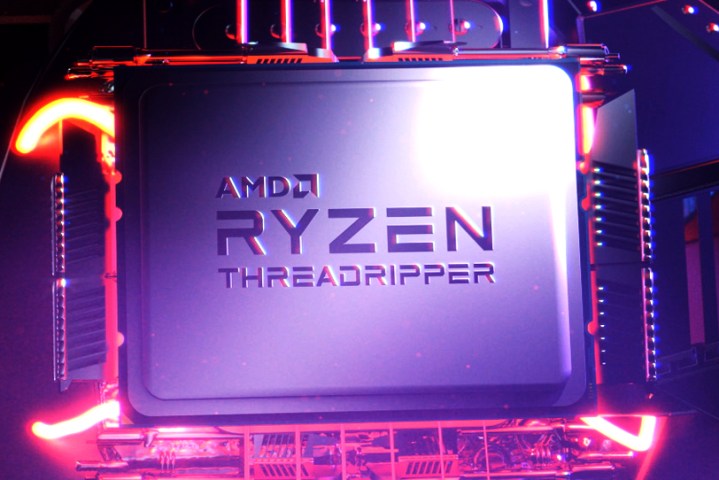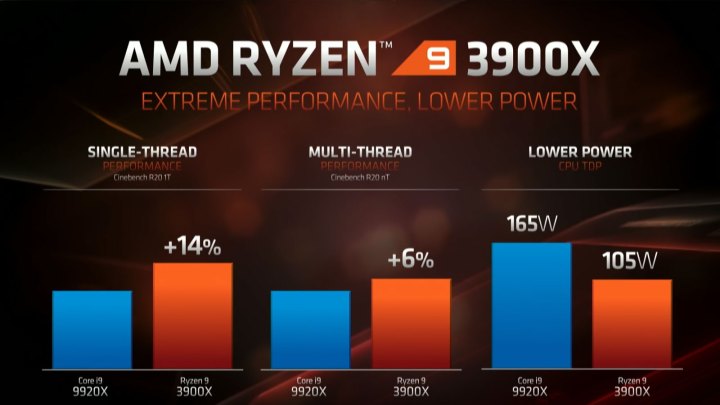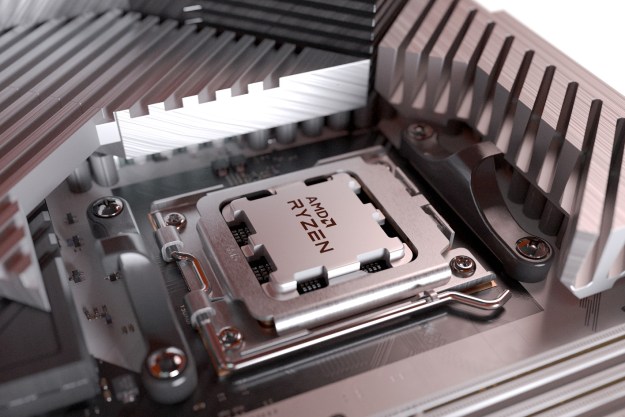
Although Intel is putting up a brave fight on the CPU front, challenging AMD to “come meet us in real-world gaming,” there’s no denying that AMD has everyone’s attention with its upcoming line of Ryzen 3000 CPUs. They’re expected to steal the performance crown from Intel for the first time in more than a decade. But the red team isn’t done yet. Following shortly after its mainstream 12-core Ryzen 3900X in July, and the monstrous 16-core, Ryzen 3950X in September, we’ve now heard tell that Ryzen 3000 Threadripper chips are coming before the end of the year. And one of them has 64 cores.
At AMD’s Next Horizon gaming event at E3, which saw the official unveiling of its full Ryzen 3000 product line and the new RX 5700 Navi-based graphics cards, we saw how top Ryzen chips compare to Intel’s HEDT CPUs. Not only did it claim that its $500 Ryzen 3900X could compete against Intel’s 9900K in gaming, AMD suggested that it was faster in multi-threaded workloads than Intel’s $1,200 9920X CPU.

The 16-core, $750 Ryzen 3950X, when overclocked to 5.375GHz on all cores using liquid nitrogen, managed to break world records previously held by heavily overclocked Intel CPUs like the 7960X and 9960X, too.
Which begs the question, what will a Ryzen 3000 Threadripper chip line be capable of? Because despite earlier concerns, WCCFTech reports that third-generation Threadripper CPUs are coming and potentially before the end of the year too. Only the top-tier, 64-core chip was mentioned, but it was said to have a full 128 threads and will be supported by a new motherboard platform, currently called X599 — although that may change to avoid confusion with Intel’s motherboards.
There’s no word on pricing, clock speeds, or design, although we’d expect the new-generation Threadripper chips to be similar to the Epyc “Rome” server CPUs: A 14nm I/O die in the center, surrounded by up to eight 7nm chiplets.
The very existence of a third-generation Threadripper lineup flies in the face of expectations made by many just a few weeks prior when Threadripper disappeared from AMD’s 2019 road map. We were never convinced it was dead, hoping, perhaps against hope, that it would return to act as a halo effect product, to showcase AMD’s dominance at the very top of the performance pile. That’s the kind of “leadership” AMD CEO Lisa Su has been talking about in her various addresses throughout the year, and with a 64-core, Zen 2 Threadripper chip, it seems almost impossible that it wouldn’t be the most capable workstation CPU in the world.
Although pricing will likely be higher than the first (and perhaps even the second) generation Threadripper chips, considering Intel’s 18-core 9980XE is $1,800, AMD could charge quite a lot more and still make it a worthwhile purchase. Since they would most likely be based on the same TR4 socket, too, they’d make for a somewhat more affordable upgrade path for potential buyers than anything Intel might have coming down the pipeline to counter it.
Updated on June 17, 2019: Corrected Ryzen 3950X world-record-breaking overclock frequency.
Editors' Recommendations
- Gigabyte just confirmed AMD’s Ryzen 9000 CPUs
- The one AMD 3D V-Cache processor you should avoid at all costs
- AMD’s new CPUs let you play Cyberpunk without a graphics card
- AMD isn’t competing with Intel anymore — Threadripper just wins
- AMD’s new CPUs decisively end the high-performance battle with Intel





